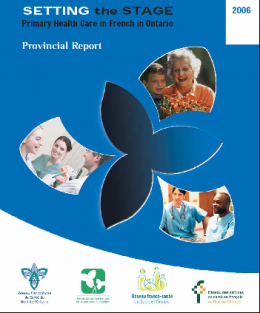Addiction Toolkit
CAMH, Center for Addiction and Mental Health
This accessible and practical reference is for health care providers who work in a primary care setting and who have patients with substance use problems. Based on current clinical evidence and the extensive clinical experience of the editors and contributors, the toolkit provides brief answers to common clinical questions, as well as relevant clinical tools and patient resources.
- Health services
- Health Sources
- Patient Centered
- Personal health practices and coping skills
- Professional Level
- Social support networks
- Tools
Canadian Foundation for Healthcare Improvement (CFHI)
The CFHI has been dedicated to accelerating healthcare improvement in Canada for the last decade. They are a not-for-profit organization with collaborations across the country that include partnerships with researchers, practice leaders and front-line clinical leaders. Since their inception in the late 1990s, they have established a pan-Canadian reach and built an international reputation.
Destination santé 2018: quality, safety and well-being in French. A document that shows strategic axes of the French health for the next five years.
Société santé en français/French only
Health care professionals and official-language minorities in Canada, 2001 and 2011
Statistics Canada, January 6, 2017
Using data from the 2011 National Household Survey and the 2001 Census of the population, this study provides a portrait of health care professionals who offered or were able to offer services to the official minority-language population. By comparing 2001 and 2011, one can see that the total number of official-language minority health care professionals increased, as did those who reported having the ability to conduct a conversation in the minority language and those who used that language at work.Interventions based on best practices for chronic disease prevention and health promotion
Public health Agency of Canada
- Best Practices
- Education and literacy
- Employment/working conditions
- Health services
- Health Sources
- Income and social status
- Organizational Level
- Patient Centered
- Personal health practices and coping skills
- Physical environments
- Social environments
Je parle français
Get on the right track to diversity and inclusion!
French speaking people are an invisible minority that are not recognized by a last name alone… Let the French speaker come to you.
Clearly place the focus on your bilingual staff using these simple and effective promotional tools. These posters, pins, and promo items have been proven effective by various Ontario organizations working with Francophone Minority Communities.
The models were enhanced in response to trials and recommendations by customers and users in health care settings.
Increase your staffs’ productivity and reduce patient confusion.
Place your order now!
Promo items prices and order sheet jan2015
- Best Practices
- Health services
- Health Sources
- Organizational Level
- Patient Centered
- Spoken language
- Tools
Médecins francophones du Canada
Médecins francophones du Canada is engaged in promoting objectives that encourage medical services of a high calibre, with human values, among Francophone physicians, and grouping them into formal and virtual networks, as well as providing them with resources and tools that will support their initiatives and their projects.
Ontario’s Policy Framework for Child and Youth Mental Health
A Shared Responsibility
As the champion of children and youth, the Ministry of Children and Youth Services (MCYS) has developed a policy framework to provide strategic direction for ongoing improvements over the next decade. The framework applies to all Ontario children and youth up to age 18.
Ministry of Children and Youth Services, November 2006
- Health services
- Health Sources
- Healthy child development
- Organizational Level
- Patient Centered
- Personal health practices and coping skills
- Systemic Level
Primer to Action — Social Determinants of Health — Revised Edition
Ontario Chronic disease Prevention Alliance (OCDPA)
A resource for health professionals, volunteers and activists to explore the influence of social determinants of health on chronic diseases
- Education and literacy
- Employment/working conditions
- Health services
- Health Sources
- Income and social status
- Physical environments
- Professional Level
- Social support networks
- Tools
Regroupement des intervenantes et intervenants francophones en santé et en services sociaux de l’Ontario (Rifssso)
Le Regroupement des intervenants francophones en santé et en services sociaux de l’Ontario (Rifssso) is a not-for-profit umbrella organization of French-speaking professionals working in the fields of health and social services. Its goal is to develop and support leadership among its members by offering them a variety of activities such as continuing professional development, networking, and so forth. In addition, Rifssso works to raise awareness within government of the challenges facing French-speaking professionals working in these fields.
Setting the stage
Primary Health Care in French in Ontario (2006) Provincial and Regional study
 Setting the Stage is a French language health services planning project. It is a national initiative of the Société Santé en français (SSF) and is funded by Health Canada through the Primary Health Care Transition Fund (Official Language Minority Communities Envelope). Over the past two years, Canada’s 17 French language health networks, including the Réseau franco-santé du Sud de l'Ontario [Franco Health Network
Setting the Stage is a French language health services planning project. It is a national initiative of the Société Santé en français (SSF) and is funded by Health Canada through the Primary Health Care Transition Fund (Official Language Minority Communities Envelope). Over the past two years, Canada’s 17 French language health networks, including the Réseau franco-santé du Sud de l'Ontario [Franco Health Network
of Southern Ontario], have been conducting a study involving both field work and documentary research. The goal of the study was to achieve a better understanding of the health needs, gaps and priorities of Francophone minority communities and to develop potential solutions. One of the project’s concrete deliverables has been all of the information and analyses now available that will facilitate decision making on the best ways of providing quality health care services to the Francophone population.
[prettyfilelist type="pdf" filesPerPage="10"]
- Best Practices
- Health services
- Health Sources
- Professional Level
- Spoken language
- Statistics and Research
- Systemic Level
Survey results to identify barriers faced by Francophones living with a disability or debilitating disease in Ontario
French provincial table for the disabled /Results in French only
- Health services
- Health Sources
- Patient Centered
- Physical environments
- Social environments
- Social support networks
- Statistics and Research
THE IMPACT OF LANGUAGE BARRIERS ON PATIENT SAFETY AND QUALITY OF CARE
Final Report

Prepared by: Sarah Bowen, PhD
For: Société Santé en français
August, 2015.
KEY POINTS
1. Significant research has been conducted on the impact of language barriers on health and healthcare, particularly over the past two decades. This research, (and several sys-tematic and critical reviews) has provided compelling evidence of the negative impact of language barriers on healthcare access, patient satisfaction and experience, as well as disparities in receipt of care between English (dominant language) proficient patients and those facing language barriers.
2. Those facing language barriers also face increased risk of medication errors and com-plications, and adverse events. The rights of limited English proficient patients to in-formed consent and confidentiality are often not protected.
3. The research on language access does not align that well with the healthcare quality and safety literature; and not all applicable research is published in commonly-cited medical journals. This may contribute to low awareness of the risks of language barriers among providers and managers.
4. Due to data limitations, limited research on impacts of language barriers has been con-ducted in the Canadian setting. However, a review of the pathways through which lan-guage barriers impact quality of care and safety indicates that much of the international research is applicable in the Canadian context.
5. In contrast to the evidence of negative impacts of language barriers on quality of care (including risk of adverse events), there is not evidence of disparities in mortality be-tween English proficient patients and those facing language barriers. This finding is not unexpected, given what is known about the pathways by which language barriers affect care quality, and limitations of methods used to investigate the impact of language barri-ers on health outcomes.
6. There are several barriers to action in addressing the risks of language barriers to quali-ty of care and patient safety: lack of awareness of current research; gaps in Canadian research; lack of language coding in Canadian data; historical framing of linguistic ac-cess as an issue of cultural sensitivity (rather than patient safety); and failure to ade-quately “translate” available evidence into healthcare action.
7. Recent research has begun to outline the complexity of pathways by which language, culture, race/ethnicity and health literacy may affect patient care.
8. Current approaches to addressing the risks of language barriers rely on the dedication and insight of individual providers rather than implementation of effective, evidence-informed strategies at the system level. This is not acceptable in light of current knowledge of effective approaches to patient safety.
9. Implications of available evidence for future research, for the SSF, and for the patient safety movement are discussed.
- Health services
- Health Sources
- Organizational Level
- Patient Centered
- Personal health practices and coping skills
- Professional Level
- Spoken language
- Statistics and Research
Toolkit to Healthier Communities — Influencing Healthy Public Policies
Ontario Chronic disease Prevention Alliance (OCDPA)
This toolkit is for anyone who wants to advance health policy in their community or encourage change at the local level. See also the accompanying resource Handbook to Healthier Communities.
VIDEOS ON THE ACTIVE OFFER OF FRENCH LANGUAGE HEALTH SERVICES
Le Réseau du mieux-être francophone du Nord de l’Ontario (RMEFNO)
This new tool, created with funding from Health Canada through an important partnership with Société Santé en français, is designed primarily for health care professionals and providers. It aims to raise awareness regarding the importance of proactively offering quality services in French to health care recipients.
Active Offer Introduction from Shebafilms Kelly Saxberg on Vimeo.
